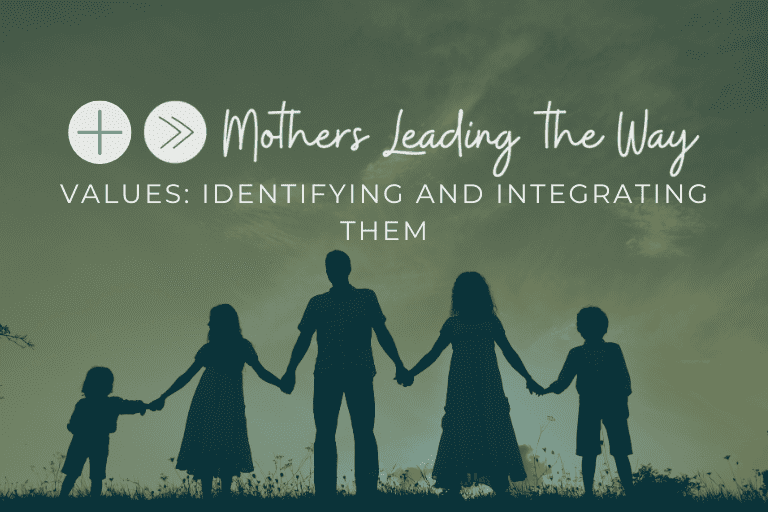What comes to mind when you think of your values? Oftentimes, people say things such as “love,” “integrity,” and “kindness,” but what about “adventure,” “independence,” or “courage”? Values can be the window to our souls and exemplify our core beliefs about what is important and meaningful in life. Values can inform our biggest ambitions and life-long goals, but they also can inform our behavior and how we make sense of ourselves, others, and the world around us.
Our values are the foundation of our identity. And in turn, they play an important role in how we operate as mothers, employees, and leaders. For example, a person who values adventure may take on new and daring projects in the workplace or may prioritize traveling to new locations with their children. Essentially, our values can shape the way we interact with our world by informing the way that we approach new situations and appreciate new experiences.
In the first installment of our VALUES CAN INSPIRE positive psychology series, we’re going to talk about how to use values to form the foundation on which you build. We will also talk about what it means to live in alignment or misalignment with our values. As you may expect, living in misalignment with our values may lead to overall life dissatisfaction, self-doubt, burnout, or even relational concerns.
The first step here is to identify what your values are. At a fundamental level, it can be as easy as listing something important to you. Multiple assessments or values exercises have been developed to identify values. Assessments like https://www.think2perform.com/values/ or https://personalvalu.es/personal-values-test can help you clarify your values so that you can begin honoring them. Even if you have completed previous values assessments, remember our core values can change over time! As we shift through different areas of life, we have different needs that sometimes require us to value different things. Remaining up to date with an awareness of your values can be helpful in leading a more content and satisfying life.
Another way to discover your values may be to use your current goals and work backward from there. For example, you may have a goal of attending all your child’s soccer games but noticed that work has come in the way recently, which has caused a lot of distress. Your goal to show up for your child may indicate that you value connection or care. You may want to attend these games so you can show your child that you care about them and want to deepen the relationship. This may help explain why you have been emotionally impacted since you have not been able to attend many of your child’s games recently. It’s also important to remember that you get to define your values in a way that is most meaningful to you! Once you’ve begun identifying your values, try and think of how you might define them.
Next, think of your future self in relation to your overall well-being. Research on the correlation between values and well-being shows that values are present in every aspect of well-being, and to have positive well-being, one needs to know and implement their values (Foad et al., 2021). For example, in an Oishi et al. (1999) study, students who placed high importance on achievement values reported feeling happier when they succeeded in academics, whereas students who highly valued indulgent pleasures experienced greater happiness on days when they attended parties. In our soccer game example, you may want to consider finding ways to build your connection or demonstrate your care for your child. This may look like finding another time or event to foster connection, or you may advocate for yourself at work to ensure you can attend your children’s activities. There is no right or wrong way of going about it, but understanding your values can deepen your understanding of yourself, your thoughts, behaviors, and emotional responses.
Lastly, think about some of the ways that your current behaviors, actions, or responsibilities do not align with your core values. Reflecting on this information may clue you into areas of stress or self-doubt. When we are consistently engaging in tasks that are inconsistent with our values, we may be living in misalignment. For example, when your personal values are aligned with your work, you are more likely to feel productive, fulfilled, and confident in all areas of your life. Alternatively, when your values and responsibilities clash, you may feel the opposite: less productive at work and at home and stagnant or detached in your relationships and career role. Identifying a misalignment in your values as early as possible helps to address areas of concern before they arise.
Now that you have identified your values, thought about how they could be impacting your well-being, and discovered areas of misalignment, let’s talk about how you can use your values. Within the workplace, you can examine how you might tailor your work to reflect those values. For example, if one of your values is learning, you may want to take the lead on work projects that require you to learn new skills or information. If one of your values is connection, you may want to consider structuring your workday to allow you to work with others. To take this a step further, if you have learning and connection as values, a great way to engage with your child may be to spend time on activities that involve you learning new things with your child! When we are able to design our days so that we can live in alignment with our values, we feel energized and more satisfied. Another fun idea may be to think about what your child’s values are and how you can do activities that are meaningful to both your child and you.
As we begin this series, we hope you will examine your values and maximize your well-being by living in alignment with your values.
References & Further Reading
Foad, C. M.G., Maio, G. G.R., & Hanel, P. H.P. (2021). Perceptions of values over time and why they matter. Journal of Personality, 89(4), 689–705. https://doi.org/10.1111/jopy.12608
Keeney, R. L. (1996). Value-focused thinking: Identifying decision opportunities and creating alternatives. European Journal of Operational Research, 92(3), 537–549. https://doi.org/10.1016/0377-2217(96)00004-5
Kesberg, R., & Keller, J. (2018). The relation between human values and perceived situation characteristics in everyday life. Frontiers in Psychology, 9, Article 1676. https://doi.org/10.3389/fpsyg.2018.01676
Oishi, S., Diener, E., Suh, E., & Lucas, R. E. (1999). Value as a moderator in subjective well-being. Journal of Personality, 67, 157–184. https://doi.org/10.1111/1467-6494.00051

